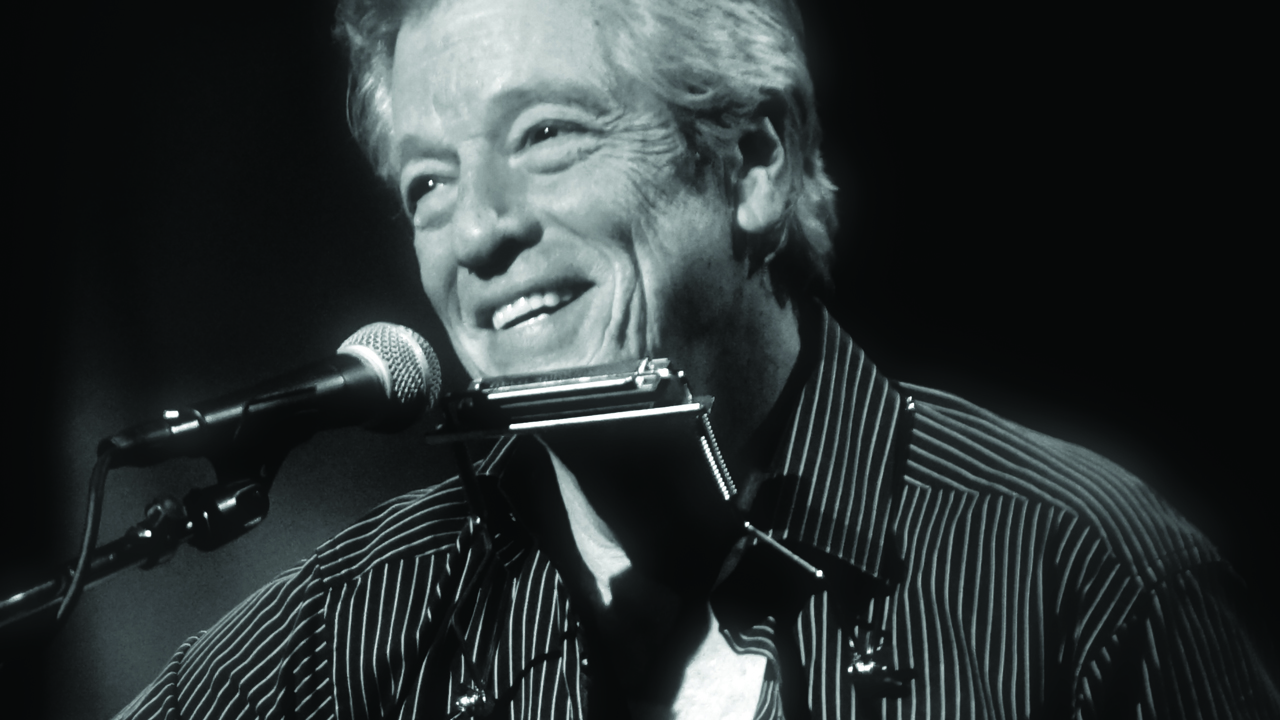Think ‘cover version’ and the connotations aren’t good. Thankfully, while John Hammond has carved out a five-decade, 35-album career with only a smattering of original material, his classic blues reinterpretations are a world away from a bar band trudging through Crossroads. Armed only with an acoustic guitar, a harmonica and his deathless voicebox, the 72-year- old New Yorker pulls everyone from Son House to Robert Johnson out of their specimen bottles and reimagines them for the modern age. “There’s no mandate,” he tells us, “that you have to write a song in order to be original.”
Is it your mission to keep these old blues songs alive?
Well, in a sense, yes. I don’t feel like a guardian or a historian or anything like that. I just happen to know stuff, and I was there and I was part of it. Y’know, I’ve got to a point now where a lot of the great artists who I worked with and got inspired by are gone. So I’m absolutely keeping the flame alive.
Is reinterpretation more enjoyable than original songwriting for you?
I enjoy them both. I’m not a prolific songwriter, but I’m a traditional blues singer and I get great satisfaction from putting across the songs that I can relate to.
It’s possible to make a cover feel fresh, isn’t it?
That’s right, exactly. And I don’t think there’s a mandate that you have to write a song in order to be original or special. If you are who you are and you put it across – that’s what folks go away with. I’ve been on shows with songwriters and maybe they’re not the best singers of their own songs. It’s hard for me to articulate, but it has to do with performance. It has to do with inspiration, with how you put it across.
Are those old blues tunes still relevant today?
Blues does not lose its point. It boils right down to the essence, and that hasn’t changed. Men are still as stupid as they ever were, and make the same mistakes that they made, over and over again, and the same conditions occur. There’s tough times and there’s fat times. And blues puts its finger on the pulse of the human condition.
Some people think acoustic isn’t as powerful as electric. Would you disagree?
I would. When you’re playing solo on a stage, and you have confidence in your style, it’s so much more intimate to hear a really good acoustic guitar than being overwhelmed by sound and electronics. That’s my opinion. There’s a lot of other opinions out there.
Blues puts its finger on the pulse of the human condition.
**You’ve played with all the greats: who’s the best you’ve seen in the flesh?
**Well, one name pops to mind immediately: Howlin’ Wolf. He was the most incredible performer I’ve ever seen. He put so much into his shows. And he kept his band straight, y’know – those guys weren’t allowed to have a drink before the show. He, and Muddy too, they revered the older tunes, y’know, the older style, the original style. I got to hang out with Wolf. He once said to me: “What you’re doing is what I did when I started out. Don’t stop.” He was physically intimidating. He knew about the business, he didn’t like to be taken advantage of. Y’know, he had a real clear feel of his position in the world. However, if he got to know you and liked you, he was a warm, thoughtful person. I admired him tremendously.
Can you tell us about the time you had Hendrix and Clapton in your band?
I knew them both as friends, and they were both in New York [in the late 60s] and came down to hear me play with my little trio. And then they both asked if they could sit in. So for a week, I had them both sitting in with me. They loved each other. I mean, you could tell. They fed off each other. They were both phenomenal. The ultimate supergroup? Well, in my opinion!
**What was it like being the son of a legendary producer [John Hammond Sr]?
**It was a little intimidating, because some promoters and club owners and other musicians didn’t see me for myself. I didn’t grow up with my father. It was only on occasions that I got to hang out with him. Count Basie was one of his best friends, and his whole orchestra would hang out with my dad from time to time. One of the most memorable things he did was to invite me up to Aretha Franklin’s first recording. I got to hear her do Today I Sing The Blues, with George Benson on guitar and her playing piano. It was just spiritual.
What makes you so prolific?
I love to play. It’s my calling. I knew it from the time I was 19 and started playing professionally, that this is what I wanted to do with my life.
So what’s your next move?
I’m not sure. I’m going to keep my options open. Y’know, I’ve got an album [Timeless] that was released last year and won the Blues Hall Of Fame award for Best Acoustic Blues Album. It’s a nice acknowledgement. I feel very good. I don’t feel like I have to jump at anything. I don’t need the exposure, as it were. I’ve learned the hard way, every step of the way. I’ve made a lot of mistakes, but I’ve made a lot of smart moves as well. And here I am, after all these years, still out there, still in demand. I mean, not like Top Of The Pops or anything like that, but still, it’s happening, and I’m very fortunate.
Timeless is out now via Palmetto

